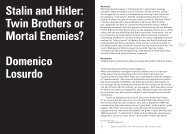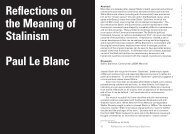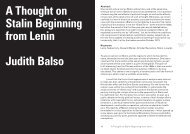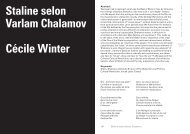adrian
adrian
adrian
- No tags were found...
Create successful ePaper yourself
Turn your PDF publications into a flip-book with our unique Google optimized e-Paper software.
Nothingness, it has always already passed into Nothingness,and so on. The first triad of the Logic is not a dialectical triad,but a retroactive evocation of a kind of shadowy virtual past,of something which never passes since it has always alreadypassed: the actual beginning, the first entity which is ‘really here,’is the contingent multiplicity of beings-there (existents). To put itanother way, there is no tension between Being and Nothingnesswhich would generate the incessant passage of one into the other:in themselves, prior to dialectics proper, Being and Nothingnessare directly and immediately the same, they are indiscernible;their tension (the tension between form and content) appearsonly retroactively, if one looks at them from the standpoint ofdialectics proper. 2Žižek then, in the immediately following paragraph, goes on toclaim that the beginning of Hegelian Logic interpreted thusly alreadyin and of itself furnishes readers with the groundless ground of amaterialist ontology of radical, ultimate contingency. 3 Prior to anyevaluation of whether Žižek is entitled to this claim on the basis heprovides in this instance, the above block quotation needs to beexegetically unpacked.In the preceding quotation, Žižek clearly chooses to pinpoint“Determinate Being”/“Being-there” (das Dasein) as the true startingpoint of the metaphysical/ontological Logic of Hegel (i.e., “Book 1,Section 1, Chapter 2” of the Science of Logic and what is inauguratedwith §89 in the Encyclopedia Logic). Of course, since the mid-twentiethcentury, the German word “Dasein” has come to be most closelyassociated with Martin Heidegger and his existential phenomenology.This is quite ironic in that Hegel’s logical dialectics of Being, Nothing,and Becoming (including implicitly on Žižek’s interpretation) canbe understood as entailing a pointed critique avant la lettre ofHeidegger’s pivotal conception of “ontological difference.” Hegellikely would accuse Heidegger of being logically inconsequent in hissharp distinguishing between Being and beings, thereby remainingunproductively confined to the initial moments of (onto)logical thinkingin his fascination with a Being that is indistinguishable from Nothing (asCRISIS&CRITIQUE#3on display in, for instance, Heidegger’s well-known 1929 essay “WhatIs Metaphysics?” 4 ). Moreover, for Hegel, the opening moments of hisLogic also capture what is essential to the chronological origins inancient Greece of the history of Western philosophy, 5 with Heidegger’sfetishization of these Greeks and their language, inherited from theGerman Romantics, thus further testifying to a dialectical-speculativeinhibition/limitation marking Heideggerian phenomenological ontology.Hegel emphasizes repeatedly that pure Being on its own prior to anyand every further determination (such as the Heideggerian ontologicalapart from the ontic) is the most meager and abstract of (onto-)logicalmoments 6 (although some were and still are tempted to mistake theundeveloped poverty of its vacuous superficiality for the accumulatedwealth of profound depths of mysterious, ineffable meanings).Heidegger aside, Žižek’s above-quoted pinpointing of the “realbeginning” of Hegelian Logic is an instance of a long-running, ongoingactivity amongst scholars of Hegel and German idealism: debatingabout from where the Hegelian System actually starts. Some of thebiggest (if not the biggest) questions concerning how to appreciatethe relationship (or lack thereof) between the Phenomenology of Spiritand the various versions of the mature Logic hinge on the topic of whenand how Hegelian philosophy proper gets well and truly underway.Disregarding those significant questions in the present context ofconsidering what Žižek asserts about the beginning of the Logic alone(I will return to these questions later), one could say that, as regards thethree major divisions of both the Science of Logic and the EncyclopediaLogic (i.e., the three books of the “doctrines” of “Being” [Sein],“Essence” [Wesen], and “Concept” [Begriff]), each division has beenclaimed by specific Hegel scholars as the genuine primordial nucleusof the Hegelian logical network. Recent examples arguably wouldinclude: Stephen Houlgate for “The Doctrine of Being” (with the thesisthat Hegel begins precisely where he appears to begin, namely, withoutpresuppositions and with indeterminate Being) 7 ; Dieter Henrich for“The Doctrine of Essence” (with the thesis that “The Doctrine of Being”4 Heidegger 1993, pp. 89-110.5 Hegel 1969a, pp. 31, 83-84, 88; Hegel 1991b, p. 10; Hegel 1991c, §13-14 (pp. 37-39), §86 (p. 138);Hegel 2008, §87 (pp. 88-89); Hegel 1955a, pp. 1-2, 4-5, 18, 29-30, 34-39, 45.CRISIS&CRITIQUE#32 Žižek 2012, pp. 228-229.6 Hegel 1969a, pp. 73-75; Hegel 1991c, §51 (p. 99), §85-88 (pp. 136-145); Hegel 2008, §51 (p. 52), §87(pp. 90-91).3 Žižek 2012, p. 229.7 Houlgate 2006, pp. 263, 266-267; Houlgate 2005, pp. 32, 40, 43-46.372 “Where to Start?: Robert Pippin, Slavoj Žižek...373“Where to Start?: Robert Pippin, Slavoj Žižek...






